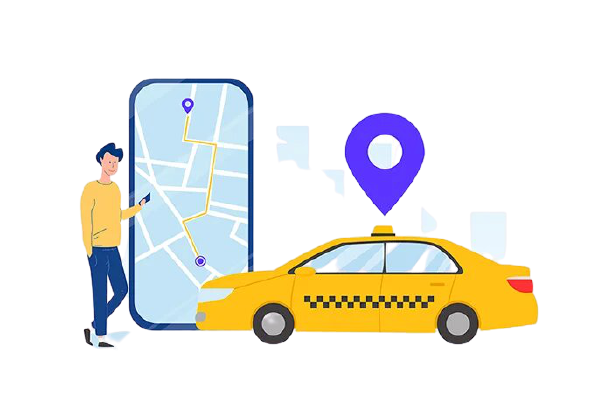
When it comes to developing a taxi booking app, choosing the right technology stack is crucial for its success. With numerous options available, it can be overwhelming to determine the most suitable technologies to build a robust and efficient app.
In this article, we will guide you through the process of selecting the right technology stack for your taxi booking app development project. We will explore factors such as front-end and back-end technologies, databases, APIs, and integration possibilities.
By understanding these key considerations, you will be equipped to make informed decisions that align with your app’s requirements, scalability, security, and performance. Get ready to embark on a journey to build a cutting-edge taxi booking app with the perfect technology stack.
Why Technology is Important For Taxi Booking App Development?
Technology plays a pivotal role in the development of taxi booking apps due to its significance in enhancing functionality, user experience, and efficiency. By leveraging appropriate technology, these apps can offer essential features such as real-time tracking, secure payments, and seamless communication between drivers and passengers.
Furthermore, technology enables the integration of third-party services like mapping and payment gateways, contributing to a comprehensive user experience. With scalable infrastructure and optimized codebase, technology ensures smooth performance even during peak usage. Additionally, robust security measures safeguard user data and build trust.
Overall, technology is vital in creating reliable, user-friendly, and successful taxi booking apps that meet the ever-growing demands of modern transportation services. It plays a crucial role in taxi booking app development for several reasons:-
Functionality
Technology enables the implementation of essential features and functionalities in a taxi booking app. From user registration and booking management to real-time tracking and secure payments, the right technology stack ensures that the app performs its core functions effectively.
User Experience
A well-designed and user-friendly interface enhances the overall experience for both passengers and drivers. Technology choices, such as front-end frameworks and responsive design, contribute to creating a smooth and intuitive user interface, making it easy for users to book rides, track their drivers, and navigate the app seamlessly.
Real-Time Updates and Tracking
Technology facilitates real-time updates and tracking capabilities, allowing passengers to monitor their driver’s location, estimated time of arrival, and other relevant information. This enhances transparency, trust, and efficiency in the taxi booking process.
Integration with Third-Party Services
Taxi booking apps often require integration with various third-party services like payment gateways, mapping services, and SMS notifications. The right technology stack enables seamless integration, ensuring a smooth and comprehensive user experience.
Scalability and Performance
Technology choices impact the scalability and performance of the app. A robust back-end infrastructure, efficient database management, and optimized codebase are essential for handling increasing user demands, maintaining app responsiveness, and delivering a seamless experience even during peak times.
Security and Privacy
Technology plays a crucial role in ensuring the security and privacy of user data. Proper encryption methods, secure APIs, and adherence to industry standards help protect sensitive information and build trust among app users.
Future-Proofing and Adaptability
The right technology stack enables flexibility and adaptability to future technological advancements and changing market trends. Choosing scalable and versatile technologies allows for easier integration of new features, updates, and expansion of the app’s functionality.
5 Reasons why one should Choose Flutter for Cross-platform App Development Project
Technology Stack Used in Taxi Booking App Development
The technology stack for taxi booking app development may vary depending on factors such as the development platform, specific requirements, and the expertise of the development team. However, here is an example of a commonly used technology stack for taxi booking app development:
Front-End Development
- Frameworks/Languages: React Native, Flutter, JavaScript, HTML5, CSS
- Tools: Redux (state management), Axios (HTTP requests), React Navigation (routing)
Back-End Development
- Server-Side Technologies: Node.js, Ruby on Rails, Django
- APIs: RESTful API for communication between front-end and back-end
Database
- Relational Databases: MySQL, PostgreSQL
- NoSQL Databases: MongoDB, Firebase Realtime Database
Real-Time Tracking and Mapping
- Integration with mapping services: Google Maps API, Mapbox
- Real-time location updates: WebSockets, Socket.IO
Payment Integration
- Payment Gateway Integration: Stripe, PayPal, Braintree
Cloud Services
- Cloud Infrastructure: Amazon Web Services (AWS), Microsoft Azure, Google Cloud Platform (GCP)
- Cloud Storage: Amazon S3, Firebase Storage
Security
- Encryption: SSL/TLS certificates, HTTPS
- Authentication: JWT (JSON Web Tokens), OAuth
Testing and Deployment
- Unit Testing: Jest, Enzyme
- Deployment Platforms: AWS Elastic Beanstalk, Heroku, Firebase
It’s important to note that this is a general representation of a technology stack and specific variations may occur based on project requirements and the expertise of the development team. The technology stack can be customized and tailored to meet the unique needs of the taxi booking app development project.
How to Choose A Mobile Application Development Company
How to Choose the Best Technology Stack for Taxi Booking App Development?
Choosing the best technology stack for taxi booking app development requires careful consideration of various factors. Here are the key steps to guide you in selecting the most suitable technology stack:
Define Project Requirements
Clearly outline the specific features, functionalities, and performance expectations for your taxi booking app. Consider factors such as real-time tracking, payment processing, scalability, and compatibility with different platforms (iOS, Android).
Assess Developer Skills and Expertise
Evaluate the skills and expertise of your development team or potential development partners. Determine their proficiency with different technologies and their ability to handle the complexity of your project.
Research and Explore Options
Conduct thorough research on available technologies and frameworks for mobile app development. Consider factors such as popularity, community support, documentation, and updates. Look for technologies that align with your project requirements and have a track record of successful implementations.
Consider User Experience
Focus on technologies that allow you to deliver an excellent user experience. Consider front-end frameworks that enable smooth and responsive interfaces, as well as back-end technologies that provide fast data processing and real-time updates.
Evaluate Scalability and Performance
Choose a technology stack that can handle increasing user demands and scale with your business growth. Look for technologies that offer robust scalability features and have a reputation for delivering high performance.
API Integrations
Consider the availability and compatibility of APIs required for your taxi booking app, such as mapping services, payment gateways, and SMS notifications. Ensure the technology stack supports seamless integration with these third-party services.
Security and Data Privacy
Prioritize technologies that provide robust security measures to protect user data and ensure privacy. Look for features such as encryption, secure communication protocols (HTTPS), and proper authentication mechanisms.
Cost and Time Considerations
Evaluate the cost and development time associated with each technology. Consider factors such as licensing fees, hosting costs, development resources, and the availability of skilled developers for specific technologies.
Test and Validate
Conduct proof-of-concept projects or prototypes using different technology stacks to assess their suitability and performance. This allows you to evaluate their compatibility with your project requirements before making a final decision.
Seek Expert Advice
Consult with experienced app developers or technology consultants who have expertise in taxi booking app development. They can provide valuable insights and help you make informed decisions.
Choose The Right Mosaic Wall Art Décor For A Fashionable Design!
Features to Incorporate in a Taxi Booking Application
When developing a taxi booking application, it’s essential to include features that enhance user experience, streamline the booking process, and ensure efficient and secure transportation services.
Here are some key features to consider incorporating in a taxi booking application:
User Registration and Authentication
Allow users to create accounts, sign in securely, and manage their personal information.
Real-Time Vehicle Tracking
Integrate GPS technology to enable users to track the location of their assigned driver in real time.
Ride Booking
Provide users with the ability to book a ride by specifying their pickup and drop-off locations, preferred vehicle type, and ride preferences.
Fare Calculation
Implement a fare calculation mechanism based on factors such as distance, time, surge pricing, and additional charges.
Multiple Payment Options
Offer various payment methods such as credit/debit cards, digital wallets, and cash payments to accommodate user preferences.
Push Notifications
Send real-time notifications to users regarding ride confirmation, driver status updates, estimated arrival time, and promotional offers.
Driver Availability and Rating System
Allow drivers to set their availability status, and enable users to rate their experience with drivers to maintain service quality.
Trip History and Receipts
Provide users with access to their past trip details, including ride history, fare breakdowns, and digital receipts.
In-App Chat and Support
Enable users to communicate with drivers or customer support through an in-app chat feature for quick assistance and problem resolution.
Review and Feedback
Encourage users to provide ratings and feedback after each ride to improve service quality and ensure driver accountability.
Multilingual and Multi-Currency Support
Cater to a diverse user base by offering language options and accepting payments in multiple currencies.
Safety Features
Include emergency contact buttons, share ride details with trusted contacts, and implement driver background checks to enhance user safety.
Advanced Booking Options
Allow users to schedule future rides, set recurring trips, and book rides in advance for added convenience.
Loyalty Programs and Discounts
Implement reward programs, referral bonuses, and promotional offers to incentivize user loyalty and attract new customers.
Integration with External Services
Integrate with external services such as mapping APIs, weather information, and traffic updates to provide accurate and efficient ride experiences.
By incorporating these essential features, your taxi booking application can deliver a seamless, secure, and user-friendly experience, ultimately enhancing customer satisfaction and driving business success.
Why is it important to choose the right POS software for your apparel business
How Much Does It Cost to Develop Taxi Booking App
The cost to develop a taxi booking app can vary depending on several factors, including the complexity of the app, the number of features, the platform(s) targeted (e.g., iOS, Android), the development team’s location and expertise, and the time required for development.
A basic taxi booking app with essential features can range from $15,000 to $30,000. However, for a more feature-rich and advanced app, the cost can increase significantly, ranging from $30,000 to $100,000 or more.
Here are some cost factors to consider:
App Design: The cost of designing the user interface (UI) and user experience (UX) can vary based on the complexity of the app’s design requirements and the level of customization desired.
Development Time: The time required for development depends on the complexity and number of features. The more features you want to include, the longer it will take to develop the app, resulting in increased development costs.
Platform(s): Developing the app for multiple platforms (iOS, Android) will increase the development costs compared to targeting a single platform initially.
Backend Development: The complexity of the backend infrastructure, such as server setup, database management, and API integrations, can influence development costs.
Integration with Third-Party Services: Integrating external services like mapping APIs, payment gateways, and SMS notifications may incur additional costs depending on the service providers and their pricing models.
Testing and Quality Assurance: Conducting thorough testing and quality assurance processes to ensure the app is bug-free and performs well across various devices and scenarios can add to the overall development cost.
Ongoing Maintenance and Updates: Consider the cost of ongoing app maintenance, bug fixes, updates, and potential feature enhancements after the initial development phase.
It’s crucial to consult with professional app development agencies or freelancers to get accurate cost estimates based on your specific requirements and desired features. They can provide detailed proposals outlining the scope, timeline, and associated costs for developing your taxi booking app.
How To Choose Right Motor Oil That Is Best For Catalytic Converters
Conclusion
In conclusion, selecting the best technology stack for your taxi booking app development is a critical decision that can significantly impact the success and performance of your app. By following a systematic approach, you can make an informed choice that aligns with your project requirements, user experience goals, scalability needs, and security considerations.
Remember to define your project requirements clearly, assess the skills of your development team, research available options, and consider factors such as user experience, scalability, API integrations, security, cost, and development time. Conduct testing and validation to ensure compatibility and performance.
Ultimately, the right technology stack will empower you to build a robust, user-friendly, and efficient taxi booking app that meets the needs of your target audience. Keep up with industry trends and advancements to ensure your technology stack remains up-to-date and adaptable to future changes.
By investing time and effort in selecting the best technology stack, you set a strong foundation for your taxi booking app, enabling it to thrive in a competitive market and deliver a seamless and delightful experience to your users.




